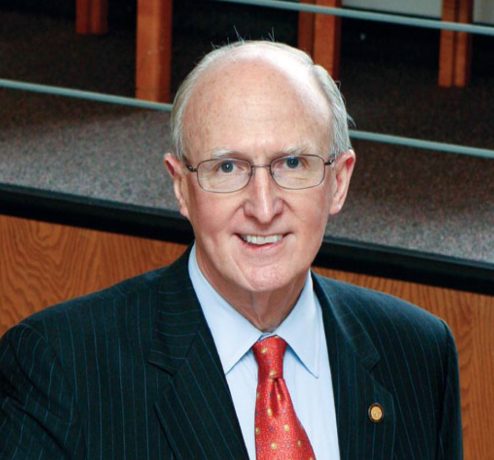Campus protests dominate the news, with many commentators offering views on the protests. Now it is my turn.
The protesters are our students. Soon after the war began in response to the horrific Hamas attack on Israel, they exercised their rights to free speech and assembly to mount peaceful protests to advocate for a ceasefire, a return of hostages and negotiations for a sustainable peace.
And they wanted the United States to broker it, just as it brokered the Good Friday accords between Northern Ireland’s political parties and the British and Irish governments.
In reaction to peaceful protests and civil disobedience, campus leaders called in militarized riot squads. Our students have seen besieged people on both sides betrayed and slaughtered.
They, and I, wonder why it is that when we show sympathy toward the people of Gaza, we are deemed antisemitic? Why can’t we hold two thoughts in mind at the same time: support for the people of Israel even as we criticize their government? After all, we can criticize our government without being unpatriotic.
We want our students to be informed, to question assertions and challenge assumptions., To know that words matter, actions have consequences. They also must know that their assertions and assumptions will be tested and their actions judged. This is the mark of an inquisitive mind. Our responses should not be to berate, bully and beat them. Instead, we should work to de-escalate the situation. We should use the tools of community activists to promote dialogue and negotiation.
We want our students to be compassionate, to think globally and to think for themselves, even in groups. We want them to promote democratic ideals, informed citizenship, and to believe in peaceful resolutions to disputes, whether personal or political. We adults should model these behaviors.
We should engage our students and educate them. The institutions where protests are moderate seem to be the places where students are taken seriously and where the faculty and administration work together to take advantage of a “teachable moment.” This moment begs for history lessons on the 2,000 years of Jewish peoples being exiled from their homes and the 1948 displacement of Palestinians by Western governments. These are histories that affect beliefs and influence actions today.
We teach about human rights and preach justice for all. Doesn’t this include Palestinians as well as Israelis? Those who define antisemitism as any criticism of Israeli policy create a “straw man.” After all, sympathy for Palestinians is not the same as support for Hamas.
Police actions at Columbia University, UCLA and elsewhere have incited sympathetic protests around the country. The media’s focus on 30-or so elite campuses has distorted the public’s knowledge of what is happening at the 4,000 other institutions of higher education.
These reports in turn inspire non-student actors to join the fray, a not unusual outcome. It also is probable that the right-wing, circus-like Congressional hearings have exacerbated tensions on campus and fostered misinformation. I wonder why these same zealots called the Jan. 6 insurrection a peaceful march instead of what it was.
The student demands vary, but the primary goal is to stop the killing. Many also want divestment from companies that provide weapons for enforcing the occupation of Palestine, disclosure of university investments and affiliations that support the war in Gaza, a boycott of relations with Israeli universities while the universities in Gaza are being destroyed, and the demilitarizing of university research.
These demands should be engaged. We need to acknowledge legitimate questions. Each “demand” is an assertion grounded in assumptions. Some assumptions can be rebutted with evidence, but providing evidence requires engagement. This is the start of the teachable moment. Engage the assertion and examine the evidence. We have seen some universities do so and end protests.
In our book, “Letters to Students: The Meaning of a College Education,” Dr. Drew Bogner and I discuss the importance of critical thinking and a knowledge of history. We say that the basics of a college education are learning to question, i.e. examining what came before whether in politics or engineering; imagination, i.e., learning from the arts, literature, and music how to consider life in new ways; compassion, i.e., putting oneself in another’s shoes and acting on their behalf; and reflection, i.e., wondering what we can learn from experiences of all types.
Unfortunately, there are politicians who want to control what is taught and how. Their brethren are banning books and attempting to substitute political criteria for professional judgment. What lessons do these actions convey to students?
Of course, the protesters need to know the difference between peaceful protest, civil disobedience, and unlawful behavior. Isn’t it our responsibility to teach them? Shouldn’t we have common sense rules about protests that specify time, place and behavior restrictions and are applied uniformly? Given the history of student protests, shouldn’t we have these rules in place to protect free speech, safety and the freedom to study?
These are our students. We owe it to them to listen. Shouldn’t we say that we recognize the humanitarian crisis and want peace, with hostages released and the restoration of healthcare, food supplies, shelter, and schools? Maybe all of us will learn from the dialogue.
Dr. Robert A. Scott, President Emeritus, Adelphi University; Co-Author, with Dr. Drew Bogner, “Letters to Students: The Meaning of a College Degree,” Rowman & Ltttlefield, forthcoming, 2024.

